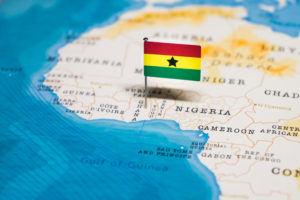Benedict Arko is the new Regional Studies Association Ambassador to Ghana. For further details about the opportunities that the RSA can offer regional studies scholars, students, and researchers in Ghana, please connect with Benedict at ben.arko@outlook.com.
Regional studies in Ghana emerged in the 1970s. Scholars in the early days of the sub-discipline were mainly focused on accounting for the very sharp economic disparities between the north and the south of the country. For those who may not be familiar with the economic geography of Ghana, a few indicators on the matter may suffice. To begin with, Ghana is a West African country with a population of 30.8m. Since 2008, the country has been classified as a lower middle income country with a Gross Domestic Product (GDP) of $78.3 billion and a per capita income of $2,466. The Gini co-efficient was put at 43.5 in 2016 and the Human Development Index (HDI) at 0.611 in 2019. In terms of regional disparities, poverty is much more concentrated in the northern regions of the country than in the south. Of the four largest economic hubs in the country, only the Tamale metropolis is in the north. Such disparities in regional development are not new but historical and have persisted at least since the colonial era.

Disparity in regional development between northern and southern Ghana
Explaining what accounts for regional development disparities has been a major focus of regional studies in Ghana since the 1970s. Varied explanations have been proffered. For instance, the eminent Ghanaian geographer, Jacob Songsorre has argued that the capitalist economic model adopted during both colonial and post-colonial eras are to blame for the regional disparities. This was based on the export of primary commodities mainly originating from the south supported by policies from both colonial and post-colonial administrations. This is what has come to be known as the Guggisberg Economic Model after the British colonial-era governor who was noted to have originated such policies with his ten year development plan which took off in 1919.
This position is quite popular among scholars. Some of these scholars have argued further that such regional disparities post-colonial rule, has been worsened by neoliberal economic reforms such as the Structural Adjustment Programme (SAP) and the Economic Recovery Programme (ERP) embarked upon in the 1980s. These policies are said to have tended to support the massive expansion of growth poles such as Accra to the detriment of the peripheries predominantly regions in the north. Another view that has gained traction in recent times is that of the political pathology of post-colonial administrations and their associated power configuration that favour southern-based growth poles to the neglect of the north.
Evaluation of governance at the local scale
The second preoccupation of scholars have been assessing regional development initiatives. Most of the discussion here has centred on local governance and local economic development. While some have advocated for the lead role of local governments in stimulating regional economies, others have sought to explain the inability of local governments to achieve such goals.
The argument made is that local governments have been deliberately structured weak to better serve the interests of political actors at the centre.
For instance, the president still nominates local mayors for approval by municipal councils of which the president appoints one-third of the membership. These mayors however can be dismissed at will by the president. Thus, political actors at the local level are more interested in the political concerns of actors at the centre than addressing local development needs.
Local economic development was then advocated as a panacea to this paralysis as it was based on the market or private sector taking a lead role in local economic decision-making. This initiative has been the brainchild of the international development organizations working in Ghana such as the International Labour Organization, the United Nations Development Programme and foreign development agencies such as the German Development Cooperation (GIZ). Scholars have sought to point out the incompatibility of local economic development with the existing power configuration which is based on a system of political patronage and clientelism. This means that there is no private sector independent of the political class to take up the lead role in local economic decision-making.
Future investigation of regional industrialization?
As Ghana’s economy is currently driven by agriculture, services and the exports of raw materials such as gold, cocoa and crude oil, very little attention has been given to regional industrialization. This however may change as the government’s decentralized industrialization policy initiative dubbed ‘One District One Factory’ takes off. This is a private-sector led initiate within a framework of state support. A few years down the line, the demons responsible for the age-old regional disparities seem to be at their best marshalling all the agglomeration forces they can muster to pull most of the factories already rolled out into the confines of the two main growth poles in the country namely Accra and Kumasi, neither of which is in the north. The implementation of the Africa Continental Free-Trade Area may also throw up some opportunities and challenges that may interest scholars. Again, the impact of the Covid-19 pandemic on local and regional economies is yet to be assessed and may pre-occupy scholars in the short to medium term.
Overall, one could say that scholars in regional studies in Ghana have a full plate going into the foreseeable future. The key issue would be whether the scientific knowledge produced would have any influence on regional policy-making in the country. The critiques of the scholars thus far seem to suggest the need for more engagement.

Benedict Arko is currently a Lecturer at the Department of Geography Education, University of Education, Winneba in Ghana. He is a development geographer with special interest in the study of the spatial dimension of development in its discourses and materializations from critical perspectives. These includes issues of regional and local economic development, decentralization, and regional and urban planning. He also has a varied background in development practice with experience from the public, non-governmental as well in international development co-operation.
Are you currently involved with regional research, policy, and development? The Regional Studies Association is accepting articles for their online blog. For more information, contact the Blog Editor at rsablog@regionalstudies.org.